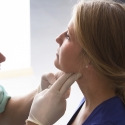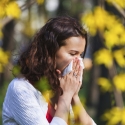Allergy Diagnosis Services
Wycoff Wellness offers a number of allergy diagnosis and treatment options. We will individualize the specific diagnosis and treatment options based on your specific history and physical.
Diagnostic Options
Allergy Skin Prick Testing
This is an easily performed option that can be performed in the office. This procedure involves using a small plastic device and making a number of skin pricks on the skin. We typically use the skin on the back or arms.
We use a device called the “Multi-Test” to test for most common inhaled allergens (pollens, molds, dust, animal dander, etc.). We can also test for common food allergies with skin testing. This type of testing is best to determine IgE medicated allergies.
The skin pricks are applied in panels of 8 allergens. We allow the skin to “react” over the next 30 minutes and then interpret the degree of reaction by the amount of swelling (wheel formation) and erythema (redness or flare reaction). We can test children as small as two months of age with this type of testing.
Blood Testing
Another option for testing allergies is with a blood test. This is a fairly simple and easy way to obtain a number of allergy tests. We can test both IgE and IgG mediated allergies with blood tests.
We utilized a number of different laboratories for this type of testing. Typically we can test for common types of allergies in panels such as a “pediatric panel” or “adult panel” which will look for common allergens in these age groups.
For most food allergy testing we prefer IgG Food Antibody Assessments. This again is an easily obtained blood test. We can often check for up to 88 common food reactions with this simple blood test.
Treatment Options
Elimination, Rotation, and Avoidance
Initial treatment of nearly all allergies begins with the identification of the allergenic inhalant, food or chemical. Once identified a process of elimination and avoidance of the offending substance can be implemented. If you do not know what is causing the problem it is hard to avoid such.
Wycoff Wellness has a vast array of information to help you make changes in your day to day routine to eliminate or avoid potential allergens. This in and of itself can provide marked improvement of your allergy symptoms.
For many food allergies, a period of elimination followed by a rotation diet may be all that is needed to improve these issues. We have a comprehensive program and guide to help you implement an effective elimination and rotation diet program.
Sublingual Immunotherapy
Sublingual (under-the-tongue drops) therapy is an effective therapy for most inhaled and food allergies. This therapy involves the administration of sublingual drops two to three times a day. We have prepared for you a specific mixture of allergenic sublingual drops and instruct you in the appropriate use of the drops.
This type of therapy is very effective and safe. It is painless to use and is often a great choice for children as it eliminates the need for periodic injections.
The downside to sublingual immunotherapy that the drops typically must be administered at least twice daily (sometime three times a day) to be effective. This makes compliance somewhat of a barrier. Nevertheless, sublingual immunotherapy is a great option to help deal with chronic allergy conditions.
Low Dose Allergen (LDA) Immunotherapy
Low Dose Allergen (LDA) immunotherapy, sometimes called ultra-low dose activated immunotherapy, is a method of treating allergies and allergic related diseases. It uses a method or low dose allergens enhanced by a minute dose of the enzyme, beta-glucuronidase. The beta-glucuronidase stimulates the production of T-suppressor cells. These cells actively “switch off” helper cells that are erroneously causing patients to be ill my misidentifying normal substances in the body to be allergens. T-cells may live for long periods in the bloodstream, so LDA needs to be administered only every 2 months at first and then less often as time passes. The injections are given with very tiny intradermal needles on the inner aspect of the forearm.
LDA is used to treat all types of allergy, sensitivity, and intolerance to inhalants (pollens, dust, mites, danders, etc.), foods and chemicals. It is used to treat such conditions as seasonal and perennial hay fever, asthma, all types of food allergy and many other medical conditions (see attached list below).
LDA immunotherapy is most effective when appropriate patient guidelines are followed before and after the injections. It is important to be aware of the various “rules” of LDA therapy and to follow these completely. Please refer to the booklet -- Low Dose Allergen Therapy – LDA Patient Instruction Booklet.
Below is a list of problems that can be treated with LDA immunotherapy. The list is a fairly complete compilation of conditions that have been shown to respond and improve with LDA therapy.
- Seasonal allergies (hay fever, spring allergies, etc.)
- Perennial allergies (year around runny nose, nasal congestion)
- Nasal polyps
- Allergic conjunctivitis
- Asthma
- Chronic sinusitis
- Chronic otitis media (ear infections or “glue” ear)
- Food allergy or intolerance
- Chemical or fume intolerance
- Migraines/severe headaches
- Eczema, chronic dermatitis
- Chronic idiopathic urticaria
- Chronic fatigue
- Candida infections
- Depression
- Insomnia
- Chronic pelvic or vulva pain
- Anosmia (lack of sense of smell)
- Interstitial cystitis
- Chronic cough
- Ankylosing spondylitis
- Contact dermatitis
- Angioedema (swelling of lips, face or tongue)
- Hyperactivity (ADD & ADHD)
- Epilepsy
- Rheumatoid Arthritis
- Ulcerative Colitis
- Crohn’s disease
- Irritable bowel syndrome, spastic colon
- Chronic diarrhea, constipation
- Chronic anal irritation
- Dermatographia
- Autism
- Sjogren's Syndrome
- Menier’s Disease
- Anaphylaxis
- Multiple Sclerosis
- Premenstrual syndrome (PMS)
- Raynaud's Disease/phenomena
- Recurrent pharyngitis/laryngitis
LDA immunotherapy is one of the best long-term treatments for most allergic conditions. It offers the convenience of infrequent administration (every 2 to 3 months) along with the highest long-term success (approximately 85%).
Wycoff Wellness is only one of 50 or so physicians in the United States who uses this type of immunotherapy. Contact our office for more details or to schedule your initial appointment at 517-333-7270 or 800-471-0255.


















